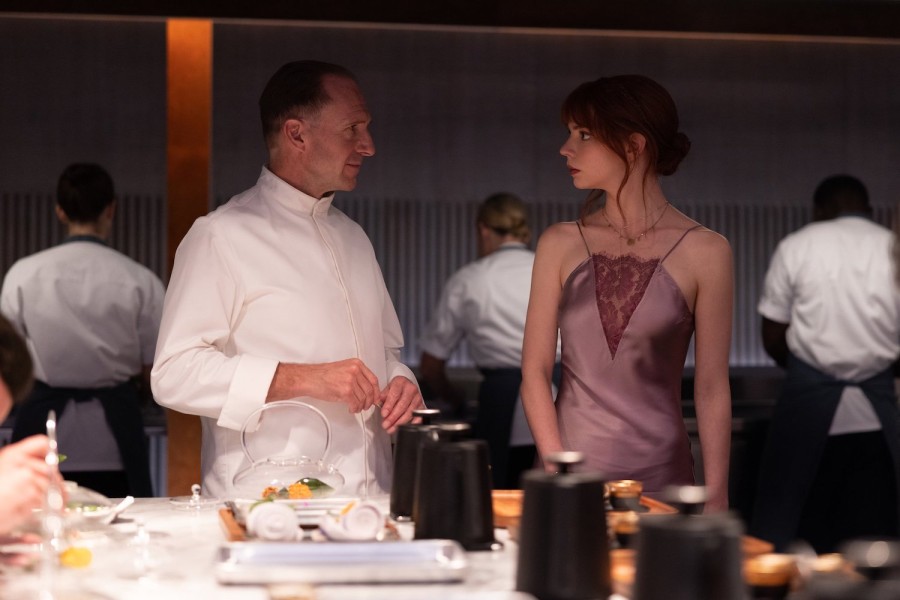Review: ‘The Menu’ feasts upon the wealthy, our finest fear
The new film starring Anya-Taylor Joy and Ralph Fiennes offers a biting plate of class satire, served with a helping of pitch-black comedy and a dash of thrills.
Ralph Fiennes and Anya Taylor-Joy in the film THE MENU. (Photo by Eric Zachanowich. Courtesy of Searchlight Pictures. © 2022 20th Century Studios All Rights Reserved)
December 15, 2022
Content warning: This article contains spoilers and descriptions of suicide.
Director Mark Mylod — whose past work includes episodes of HBO’s “Succession” and “Game of Thrones” — is no stranger to commenting on the class inequities that divide our society, which seems to be a popular theme across contemporary TV shows and movies.
This array of critically acclaimed media, including “Parasite”, “Don’t Look Up” and the aforementioned “Succession,” all seem to have their own spin on how much we should hate the rich. “The Menu” doesn’t reinvent the wheel, but its masterful composition, snappy dialogue and haunting score provide a palpable, rich tension that marks it as a distinct work of its own.
The movie begins with the cool and collected Margot Mills (Anya-Taylor Joy), smoking a cigarette and getting reprimanded by her visibly nervous partner, Tyler (Nicholas Hoult). Already, we’re shown the constituents of this dynamic — Margot is a skeptic and lives to the beat of her own drum, whereas Tyler cares a bit too much about his image and standing.
The two are whisked away by boat to a private island, where the exclusive Hawthorne restaurant rests. Among its elite guests — including but not limited to a food critic (Janet McTeer), a washed up actor (John Leguizamo) and an aging businessman (Reed Birney) — only Margot seems to note the off-kilter nature of things, which frames her as an out-of-place commoner that doesn’t know the dramatics that come with fine dining. The eerie island tour by the maitre d’or Elsa (Hong Chau) doesn’t seem to break up the creeping concern that something awry is cooking.
Veteran thespian Julian (Ralph Fiennes) commands the screen with a twisted performance as the megalomaniac head chef and king of the kitchen — he speaks almost exclusively in monotone, with not a glimmer of light in his eyes as he serves the guests delectable haute cuisine with increasingly hilarious description cards. His thinly-veiled contempt for his guests shines brilliantly through his terse body language, exasperated line delivery and acts of sheer pettiness as he condemns the actor’s girlfriend to death.
The film’s first turning point occurs when a course called “The Mess” is presented by Slowik’s sous chef, Jeremy. After an unsettling introduction involving Slowik utterly berating Jeremy’s relentless dedication to chasing the success that comes with being a renowned chef, Jeremy finally surprises the audience with the messiest dish of all: a gun in the mouth. He commits suicide in front of the entire restaurant, horrifying the guests. After a first act that was solid, but a little unsure of itself, “The Mess” cleaned things up.
The suspense became tighter, the dialogue became sharper and the camerawork became crazier. At any moment, it felt like all of these characters, with their various degrees of unlikeability, could die if they even dared to breathe wrong. Even with their elite statuses in the food, film or finance world, they are all feeble mice at the hands of Julian and his carefully curated crazy cuisine.
The themes of class solidarity and parasocial celebrity culture particularly shine through in “The Menu.” Anya Taylor-Joy proves herself to be a worthy match for Fiennes’ aforementioned acting prowess, as her confident and cunning performance throws a wrench at Slowik’s “eat the rich” operation. Hoult puts on a dastardly performance as Tyler, a Slowik fanboy who has a chilling lack of regard for the frequent violence around him, and happily wines and dines as lives get cut short in front of him. He feels he is above dying at the hands of his idol, believing his expertise and vast knowledge of Slowik’s works makes him superior to the rest of the self-absorbed, parasitic guests who have supposedly committed the grave crime of contributing to the decline of Slowik’s mental state.
Sometimes lessons and metaphors come with the subtlety of a flambé, and “The Menu” is a delectable concoction. In a world where the headlines of the Earth’s richest can easily be confused with “The Onion,” and where “Don’t Look Up” got nominated for Best Picture, is heavy-handedness really such a crime? The magnificent ensemble cast, pristine production values and refusal to turn down the dial prove “The Menu” to be a film worth a taste of your time.
Contact Ekene Onukogu at [email protected].

























































































































































